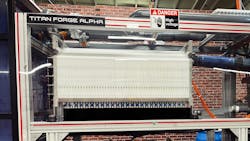Out of Thin Air? Prometheus Promises E-Methanol Fuel Crossing Carbon Capture, Water and Solar
Alternative energy startup Prometheus, which is promising to make e-methanol from using air, electricity and off-grid solar power, is telling the world that its proprietary e-fuel production system has reached commercial readiness at its Santa Cruz, California testing plant.
The company says its Titan Forge Alpha prototype has integrated a 50-cell Faraday Reactor (pictured) to validate its technology. The e-Fuel purportedly is created utilizing direct air carbon capture (DAC) to combine atmospheric carbon dioxide (CO2), water, electricity and nanotube membranes, according to reports.
Prometheus has reported to have pre-sold more than 11 million tons of e-Fuel, for road and air vehicles, to be delivered over the next decade. Titan Fuel Forge One is the company’s first commercial-scale fuel production system.
“This milestone marks a turning point, not just for Prometheus, but for the future of energy,” said Rob McGinnis, founder and CEO of Prometheus. “We’ve invented and built an integrated DAC and fuel synthesis system that captures carbon from the air, runs on renewable energy, and produces e-Fuels that cost less than fossil at scale. It’s the kind of innovation that doesn’t just move the needle, it resets the standard. After years of development and validation, we’re now ready to scale and meet the world’s growing demand for energy.”
The Faraday Reactor, a hydrocarbon electrolyzer converting CO2 from an integrated DAC tower directly to fuel, is an essential part of Prometheus’ system, the company noted in its announcement. The system, designed to operate on variable power inputs, flourishes in remote, off-grid environments where wind and solar energy are abundant, for low-cost, distributed fuel production at a global scale.
Prometheus founder McGinnis is a scientist who previously worked on water technologies including desalination and forward osmosis. He has founded other companies such as Mattershift and Oasys Water.
The company hopes to produce internal combustion and sustainable aviation jet fuel from its products. Two years ago, Prometheus partnered with female race car driver Sabre Cook during her first season in the Porsche Carrera Cup North America.
Prometheus Fuels has been featured in earlier articles at CNBC and the Massachusetts Institute of Technology and partnered on research into next-generation sustainable aviation fuels by the Mission Possible Partnership, among others.
Silicon Valley business incubator Y Combinator selected Prometheus Fuels technology for investment in 2019, while automaker BMW also provided capital for the startup’s development phase.
Exploratory Fuels of the Future: From NA+ Batteries to Volcanic Geothermal
Check out EnergyTech's free E-Book on Experimentation toward Net Zero
About the Author
Rod Walton, EnergyTech Managing Editor
Managing Editor
For EnergyTech editorial inquiries, please contact Managing Editor Rod Walton at [email protected].
Rod Walton has spent 17 years covering the energy industry as a newspaper and trade journalist. He formerly was energy writer and business editor at the Tulsa World. Later, he spent six years covering the electricity power sector for Pennwell and Clarion Events. He joined Endeavor and EnergyTech in November 2021.
Walton earned his Bachelors degree in journalism from the University of Oklahoma. His career stops include the Moore American, Bartlesville Examiner-Enterprise, Wagoner Tribune and Tulsa World.
EnergyTech is focused on the mission critical and large-scale energy users and their sustainability and resiliency goals. These include the commercial and industrial sectors, as well as the military, universities, data centers and microgrids. The C&I sectors together account for close to 30 percent of greenhouse gas emissions in the U.S.
He was named Managing Editor for Microgrid Knowledge and EnergyTech starting July 1, 2023
Many large-scale energy users such as Fortune 500 companies, and mission-critical users such as military bases, universities, healthcare facilities, public safety and data centers, shifting their energy priorities to reach net-zero carbon goals within the coming decades. These include plans for renewable energy power purchase agreements, but also on-site resiliency projects such as microgrids, combined heat and power, rooftop solar, energy storage, digitalization and building efficiency upgrades.

